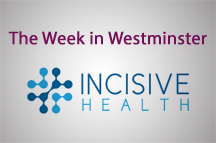 It was a busy few days for healthwatchers this week, with a bumper crop pre-election giveaways and scathing attacks. Of course this is just a taste of things to come; as May approaches, the focus on health and the NHS is only likely to increase.
It was a busy few days for healthwatchers this week, with a bumper crop pre-election giveaways and scathing attacks. Of course this is just a taste of things to come; as May approaches, the focus on health and the NHS is only likely to increase.
On Tuesday, Chief Executive of NHS England Simon Stevens announced the 29 ‘vanguard’ projects that have been selected to be the trailblazers of integration and innovation. Channeling his Five Year Forward View’s approach of driving service reform from the bottom-up rather than the top-down, Stevens predicted that this first wave of ‘game-changing’ initiatives could improve the care of over five million patients across England.
This significant next step in Five Year Forward View implementation will be politically helpful and Health Secretary Jeremy Hunt was again more than happy to be associated with the much-admired Stevens agenda. But for the second time in a month, his Labour opponent was forced to give a lukewarm response to a policy that sits firmly within his own vision for the NHS of the future.
.jpg) Wednesday started with a new life sciences package focusing on further investment in genetic innovation and headline-friendly case studies pointing to a future in which patients could have personalised treatment based on their own genetic makeup. Jeremy Hunt and his life sciences minister George Freeman also announced the first drug to be fast-tracked to patients using the new Early Access to Medicines (Eams) scheme. As challenging questions continue to be asked about the future of the Cancer Drugs Fund, Eams afforded the Government a day of positive coverage on the complex issue of access to costly pioneering medicines.
Wednesday started with a new life sciences package focusing on further investment in genetic innovation and headline-friendly case studies pointing to a future in which patients could have personalised treatment based on their own genetic makeup. Jeremy Hunt and his life sciences minister George Freeman also announced the first drug to be fast-tracked to patients using the new Early Access to Medicines (Eams) scheme. As challenging questions continue to be asked about the future of the Cancer Drugs Fund, Eams afforded the Government a day of positive coverage on the complex issue of access to costly pioneering medicines.
If it was innovation in the morning, Wednesday afternoon saw the focus switch to public health. Symbolically designed to coincide with this year’s No Smoking Day, MPs were finally given the chance to vote for (if not debate) the introduction of standardised cigarette packaging. To the delight of health campaigners and the fury of the tobacco industry, the new non-branded boxes will - House of Lords permitting - be compulsory from 2016.
 Although a designated a free vote, there was some surprise at the scale of the Conservative ‘rebellion’, with 104 Tory MPs defiantly trooping through the no lobby, including senior Government ministers Liz Truss, Chris Grayling and Esther McVeigh. Opponents’ fears of a rise in counterfeit cigarettes and impact on small shops, coupled with questions about how effective the policy would actually be in cutting youth smoking did nothing to dampen the excitement of supporters.
Although a designated a free vote, there was some surprise at the scale of the Conservative ‘rebellion’, with 104 Tory MPs defiantly trooping through the no lobby, including senior Government ministers Liz Truss, Chris Grayling and Esther McVeigh. Opponents’ fears of a rise in counterfeit cigarettes and impact on small shops, coupled with questions about how effective the policy would actually be in cutting youth smoking did nothing to dampen the excitement of supporters.
Meanwhile, Andy Burnham was in angry form this week, busy attacking the Government’s record on cancer. Labour released a slew of evidence criticising the Coalition’s record on waiting times for cancer tests, and delays on the delivery of promised radiotherapy, proton beam therapy and bowel cancer screening projects.
Coincidentally (or not) Labour’s attacks were backed up by the Public Accounts Committee’s report on cancer services, which concluded that the Department of Health and NHS England have ‘lost momentum’ in their drive to improve cancer services over the last two years. In a highly critical report, the Committee highlighted England’s comparatively poor cancer survival rates and the downgrading of cancer as a priority within the new NHS regime.
Given all of this, and the importance of the NHS as an electoral issue in the mind of the general public, we might have expected Ed Miliband to use PMQ’s to hammer the Prime Minister on cancer. Rather, he chose to use all six questions on ‘debate-gate’ for the second week in a row. Yes, guaranteed coverage on the news bulletins was secured. But with just two more opportunities to use PMQs to win over the public before the election, was this a missed opportunity to have David Cameron squirming over broken promises on cancer not debates?












